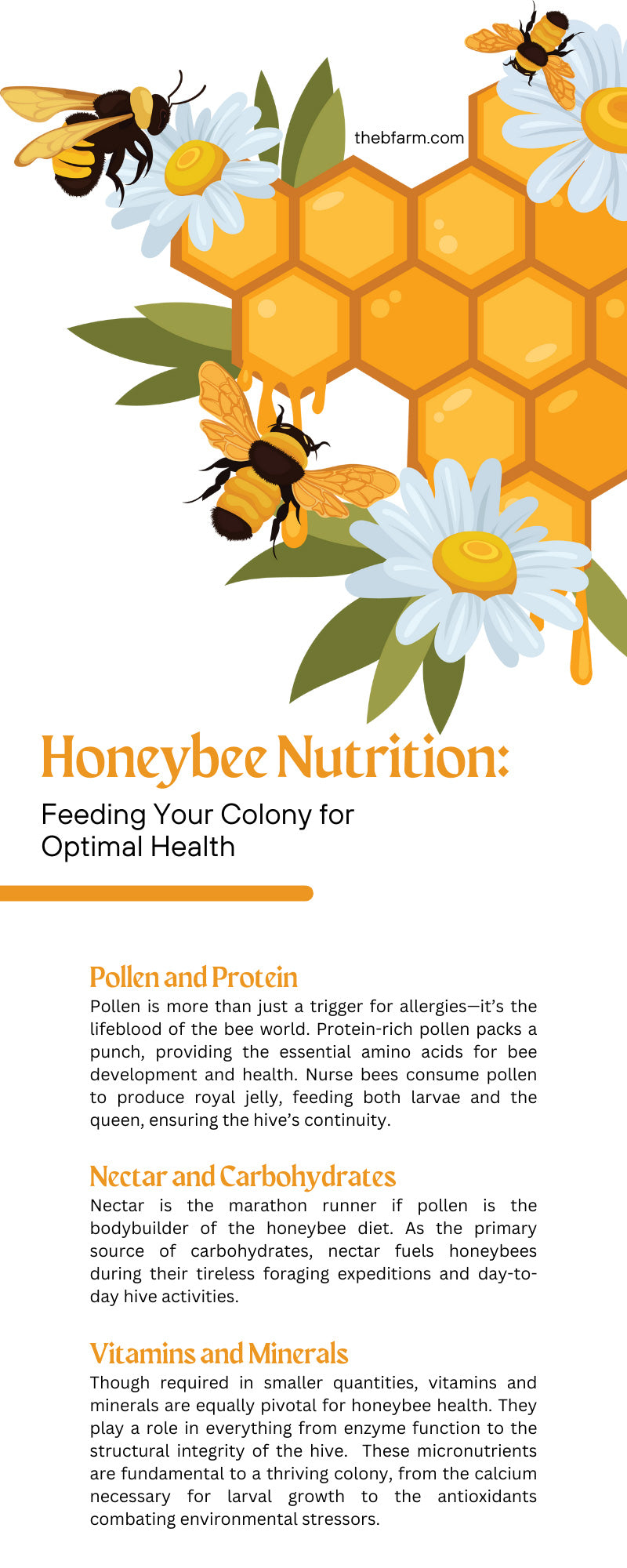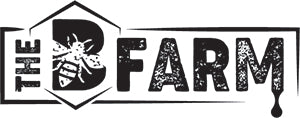Beekeeping is a pursuit as ancient as it is essential, requiring a blend of art, science, and deep reverence for nature’s most industrious pollinators. As beekeepers, understanding the intricacies of honeybee nutrition isn’t just beneficial—it’s imperative to regularly practice feeding your colony daily for optimal health.
Equipping yourself with knowledge about honeybee nutrition and feeding your colony for optimal health isn’t merely a choice; it’s a responsibility in an era where bee populations face unprecedented challenges. So, let’s embark on a journey through the fascinating world of honeybee nutrition and unfold the secrets to a thriving hive.
Understanding Honeybee Nutrition
The cornerstone of honeybee health lies in a balanced diet tailored to these insects’ complex needs. Honeybees require proteins, carbohydrates, vitamins, and minerals to perform various physiological functions and to maintain their immune systems.
Honeybees, like us, thrive on a diverse diet. Most of their nutrition comes from two primary sources, each critical for varied reasons: pollen, which provides protein, and nectar, which provides carbohydrates. Various micronutrients supplement these dietary staples from a honeybee’s natural foraging.
Pollen and Protein
Pollen is more than just a trigger for allergies—it’s the lifeblood of the bee world. Protein-rich pollen packs a punch, providing the essential amino acids for bee development and health. Nurse bees consume pollen to produce royal jelly, feeding both larvae and the queen, ensuring the hive’s continuity.
But not all pollen is created equal. The protein content can vary widely among plant sources, so a varied foraging range is crucial for colony health. It’s a beekeeper’s task to ensure their environment is rich with diverse flowering plants.
Nectar and Carbohydrates
Nectar is the marathon runner if pollen is the bodybuilder of the honeybee diet. As the primary source of carbohydrates, nectar fuels honeybees during their tireless foraging expeditions and day-to-day hive activities. These sugary droplets also function as the raw materials for that liquid gold we know as honey.
Beyond its energetic value, nectar brings together the colony collectively. For example, during honey production, bees will use trophallaxis, passing nectar mouth-to-mouth to reduce moisture content and add enzymes, transmuting it into honey.
Vitamins and Minerals
Though required in smaller quantities, vitamins and minerals are equally pivotal for honeybee health. They play a role in everything from enzyme function to the structural integrity of the hive. These micronutrients are fundamental to a thriving colony, from the calcium necessary for larval growth to the antioxidants combating environmental stressors.
Natural foraging behavior generally meets these needs as bees absorb mineral-rich plant sap and vitamin-laden pollen. However, a nutrient-scarce environment can necessitate beekeeper intervention to maintain a balanced bee diet.
Supplementing Bee Nutrition
Even the most seasoned beekeepers sometimes face scarcity due to poor weather, monoculture crops, or pesticide use. Supplementing your colony’s diet when natural resources fall short can be the difference between survival and collapse.
The “when” and “how” are critical, whether you’re supplementing with pollen substitutes, sugar syrup, or specialty feeds designed to mimic natural nectar. Too much intervention can disrupt natural foraging behavior, while too little can leave your bees undernourished. Timing these supplements to fill gaps without creating dependencies is a delicate area each beekeeper must learn.
Crafting the Perfect Menu for Your Bees
Offering the right types of food to your bees is critical. At the heart of bee nutrition lies various food sources designed to mimic the diverse array of nature.
Pollen Substitutes
High-quality pollen substitutes can help bridge the gap when natural pollen is scarce. Scientists formulate these alternatives with a blend of essential amino acids and proteins, providing the bees with the needed nutritional complexity. Also, they assist in sustaining the hive’s vigor, especially during critical brood-rearing periods.
Sugar Syrup
Sugar syrup is a valuable supplement for bees when natural nectar is scarce. It provides a consistent source of energy, mimicking nectar’s properties. Beekeepers rely on sugar syrup to support their colonies during times of limited foraging opportunities or in preparation for winter. This intervention prevents starvation, strengthens the hive, and ensures the bees are ready for the next bloom.
Essential Oils
Essential oils promote hive health and resilience. Some oils to consider are thyme oil, which helps combat varroa mites; lemongrass oil, which enhances hive cohesion; and spearmint oil, which supports the bee’s digestive tract.
Common Nutrition-Related Issues
Recognizing the signs of nutritional stress is vital for proactive beekeeping. It allows beekeepers to take necessary actions to ensure the well-being of their colonies. Some warning flags to watch out for include sluggish behavior, reduced laying patterns from the queen, or high mortality rates in larvae. Reevaluate your colony’s dietary intake if you notice these symptoms.
Neglecting nutritional deficiencies can have severe consequences, such as weakened immunity, increased susceptibility to diseases, decreased productivity, and, ultimately, colony collapse. The best way to prevent these outcomes is to establish preventative measures, such as maintaining a bee-friendly habitat, staying informed about local flora cycles, and embracing seasonal supplemental feeding when necessary.
Seasonal Adjustments in Hive Nutrition
Seasonal adjustments are a critical part of bee nutrition management—spring’s bloom, summer’s abundance, autumn’s preparation, and winter’s survival are unique chapters in a colony’s life, each requiring different nutritional strategies. And with these strategies comes a time for beekeepers to keep a year-round care calendar. These will help you keep track of the proper steps to take each season.
Spring
Beekeepers should position the hives so the bees can take full advantage of emerging pollen and nectar sources as spring awakens the flora. Spring is also the perfect time to feed protein supplements to support brood expansion. The focus shifts to ensuring that hives are strong enough to make the most of the honey flow as the season marches into summer.
Fall
Come fall, the objective turns to preparing the bees for colder days. Feeding carbohydrate-rich supplements like sugar syrup can help build the honey stores to sustain the hive through winter. Winter is a time for monitoring and minimal intervention, ensuring bees have enough stores to last until spring without encouraging premature brood rearing.
Beekeeping Nutrition Starts at The B Farm
After looking over the essentials of honeybee nutrition and learning how to feed your colony for optimal health, the necessity of caring for the hive becomes apparent. The B Farm’s commitment to this delicate equilibrium combines progressive thought and respect for timeless beekeeping traditions. Remember: A well-nourished colony is an abundant colony—and for those eager to embark on this journey with vigor and assurance, this is where we come in.
The B Farm offers robust, nutritionally balanced bee nucs for sale online, ready to revitalize your beekeeping endeavors, whether you’re just beginning your beekeeping adventure or looking to fortify an established apiary. Each nuc is a testament to our promise of quality and sustainability, providing you with the resources to foster healthy bees and bountiful hives.

